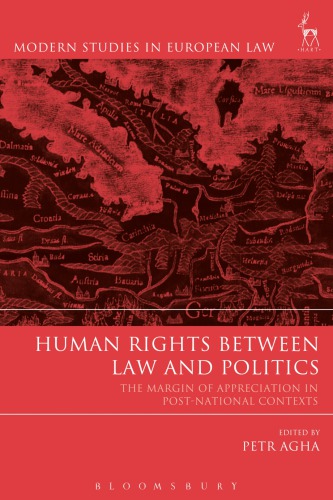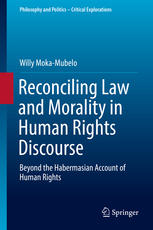Human rights between law and politics the margin of appreciation in post national contexts 1st edition by Petr Agha 1509902811 9781509902811
$50.00 Original price was: $50.00.$25.00Current price is: $25.00.
Human rights between law and politics the margin of appreciation in post national contexts 1st edition by Petr Agha – Ebook PDF Instant Download/DeliveryISBN: 1509902811, 9781509902811
Full download Human rights between law and politics the margin of appreciation in post national contexts 1st edition after payment.

Product details:
ISBN-10 : 1509902811
ISBN-13 : 9781509902811
Author: Petr Agha
This book analyses human rights in post-national contexts and demonstrates, through the case law of the European Court of Human Rights, that the Margin of Appreciation doctrine is an essential part of human rights adjudication. Current approaches have tended to stress the instrumental value of the Margin of Appreciation, or to give it a complementary role within the principle of proportionality, while others have been wholly critical of it. In contradiction to these approaches this volume shows that the doctrine is a genuinely normative principle capable of balancing conflicting values. It explores to what extent the tension between human rights and politics, embodied in the doctrine, might be understood as a mutually reinforcing interplay of variables rather than an entrenched separation. By linking the interpretation of the Margin of Appreciation doctrine to a broader conception of human rights, understood as complex political and moral norms, this volume argues that the doctrine can assist in the formulation of the common good in light of the requirements of the Convention.
Human rights between law and politics the margin of appreciation in post national contexts 1st table of contents:
1 Universalism and Relativism in the Protection of Human Rights in Europe: Politics, Law and Culture
I. Introduction
II. The Relative Universality of Human Rights
III. Human Rights, Multiculturalism and Minority Rights
IV. The Margin of Appreciation Doctrine under the ECHR
V. Culture and the Margin of Appreciation
VI. Conclusion
2 On the Varieties of Universalism in Human Rights Discourse
I. Introduction: Europe, Human Rights and the Universal
II. Modernist Universalism and its Critics
III. The Limits of Particularism and the Returns of the Universal
IV. Human Rights and Hegemonic Universalism
V. Concluding Thoughts
3 When Human Rights Clash in ‘the Age of Subsidiarity’
I. Introduction
II. Setting the Scene: Preliminary Remarks on the Margin of Appreciation and Subsidiarity
III. The Court, the Margin of Appreciation and Human Rights Clashes
IV. The Court and the “Clashing Rights” Principle
V. A Reinterpreted Role for the Margin of Appreciation in Human Rights Clashes
VI. Conclusion
4 The Margin of Appreciation as an Underenforcement Doctrine
I. Introduction
II. Underenforcement, Institutional Considerations and the MoA
III. Explaining the Underenforcement of Convention Rights: Resource-Bounded Enforcement of the ECHR
IV. Justifying the Underenforcement of Convention Rights: Normative Institutional Considerations
5 Anything to Appreciate?
I. Introductory Remarks
II. Jurisprudential Triviality of the Margin of Appreciation Doctrine: General Remarks
III. The Council of Europe between the Universality of Rights and the Particularity of Cultures
IV. The Semantics of Rights in Politics, Law and Public Morality: From Normative Philosophies to the
V. Human Rights, Their Evolution and Paradoxes: A Sociological Perspective
VI. Human Rights as Power Constellations
VII. The Force and Limits of Legal Doctrine
VIII. Anything But Discretionary Power?
IX. From Different Reasons to the Reasonable Differences in the Margin of Appreciation of Doctrine
X. Concluding Remarks: Human Rights, Functional Differentiation and the Impossibility of Justice
6 The Prisoner”s Dilemma
I. Introduction
II. Two Versions of the Margin of Appreciation
III. The European Saga of Prisoners’ Voting Rights
IV. Framing the Issue: Legal or Political Constitutionalism?
V. The MoA and Proportionality Review: Trivialising the Right to Vote
VI. Reasoning on the Right to Vote
7 Social Sensitivity, Consensus and the Margin of Appreciation
I. Approaches to the Margin of Appreciation
II. Sexuality and Same-Sex Partnerships
III. Morally Contentious Expression
IV. Conclusion
8 Religious Rights and the Margin of Appreciation
I. Introduction
II. The Place of Religion in the ECHR
III. Religion and Human Rights
IV. The Jurisprudence of the ECtHR on Religious Rights
V. The MoA in Religious Cases
VI. Case Study: Fernandez Martinez v Spain
VII. Concluding Comments
9 The Paradox of Human Rights and the Role of the European Court of Human Rights in Keeping it Alive
I. Preliminary Remarks
II. Human Rights as a Means, Not as an End
III. Human Rights as a Self-authored Normative Framework
IV. Conclusions
People also search for Human rights between law and politics the margin of appreciation in post national contexts 1st:
human rights vs political rights
are human rights politics
what is human rights law
relationship between human rights and politics
what’s the difference between political rights and human rights
Tags: Human rights, law, politics, the margin, appreciation, national contexts, Petr Agha
You may also like…
Jurisprudence & Law - Foreign & International Law
Politics & Philosophy - Government & Politics
Politics & Philosophy - Government & Politics
Politics & Philosophy
Politics & Philosophy - Social Sciences
Jurisprudence & Law
Politics & Philosophy
Uncategorized
Politics & Philosophy - Anthropology












